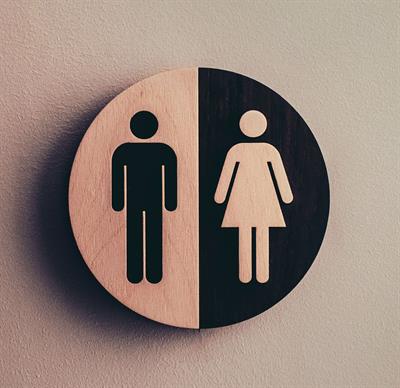Back in the day, when I studied Latin at a girls’ grammar school, I learnt that all nouns had a gender – masculine, feminine, neuter. The masculine/ feminine, minus the neuter, found its way into French grammar lessons too, but not into English – which was a relief as our language is quite complicated enough already.

Sex (male / female) was studied in biology classes and, as I attended a reasonably progressive school, we learnt about sex and sexual reproduction in humans rather than rabbits. (Not sure who was the more embarrassed; the young male teacher, or the increasingly pink faced girls he studiously avoided eye contact with, as he delivered the lesson to the back corner of the ceiling).
Outside school, we understood gender to be a polite alternative to using the word sex – with its happy or embarrassing (depending on your point of view) extra meaning of sexual intercourse. Hence, forms that asked for someone to indicate their sex, would often be completed with comments like ‘yes please,’ or ‘five times a night.’ Asking for someone to indicate their gender, though, would get the more useful, if duller, reply ‘male’ or ‘female,’ or possibly ‘prefer not to say / other.’
But language around gender has become more complicated and charged, especially in the last decade or so. Since the 1970s, in academic circles, the term was slowly expanded to deliver a range of other nuanced meanings. Yes, it has continued to be a grammatical term used in the study of many languages, and a very commonly used synonym for sex among the general population, but, spreading from academia, a common understanding is being lost in a range of subtle extra definitions.
Hence, gender is sometimes used to denote social stereotypes that are sex based (male / female). Viz: high heels and lippy = feminine; a fondness for DIY and car engines = masculine. Gender is also being used to differentiate between social roles – carer / cleaner / housewife = female; breadwinner / captain of industry / janitor = male. To women coming of age in the late 60s – 80s, who were brought up with the notion that girls can do or be anything – engineers, mechanics … (and likewise boys can wear velvet and become nurses …), such biological determinism doesn’t sound remotely progressive.
These seem to have been, however, steps on the way to introducing the notion of ‘gender identity’ into the language. I.e. no matter that your sex was recorded as male or female when you were born, you are the gender you feel most comfortable as (or conform most stereotypically to?) Hence some high profile trans identified males, who choose to live their public lives in dresses and high heels, have stated that they feel they perform femininity better than most women. In contrast, that is, to many women, particularly over a certain age, who happily slop around in sensible shoes and slacks (Velcro rocks!) and never doubt their femaleness. A trans acquaintance, aware of these language nuances but grounded in biological reality, says about gender v sex – ‘I identify with women, not as a woman.’ It’s a nice distinction; both thoughtful about the purpose behind transitioning, and considerate of female sensibilities.
Writing about sex and gender, even when it is not the direct subject of your book, has become a tricky area. So many readers are still blissfully ignorant that gender is anything other than a politer term for sex, but others – some of them quite forceful – insistent that gender, as in ‘gender identity’, trumps sex as a person’s defining attribute, whether that ‘person’ is the author, reader, or a character in the book. Which creates a potential minefield for modern writers in some genres.
Links to my books and social media
You can find all my books and short stories on Amazon books, At least one story always free. ALL BOOKS FREE ON KINDLE UNLIMITED